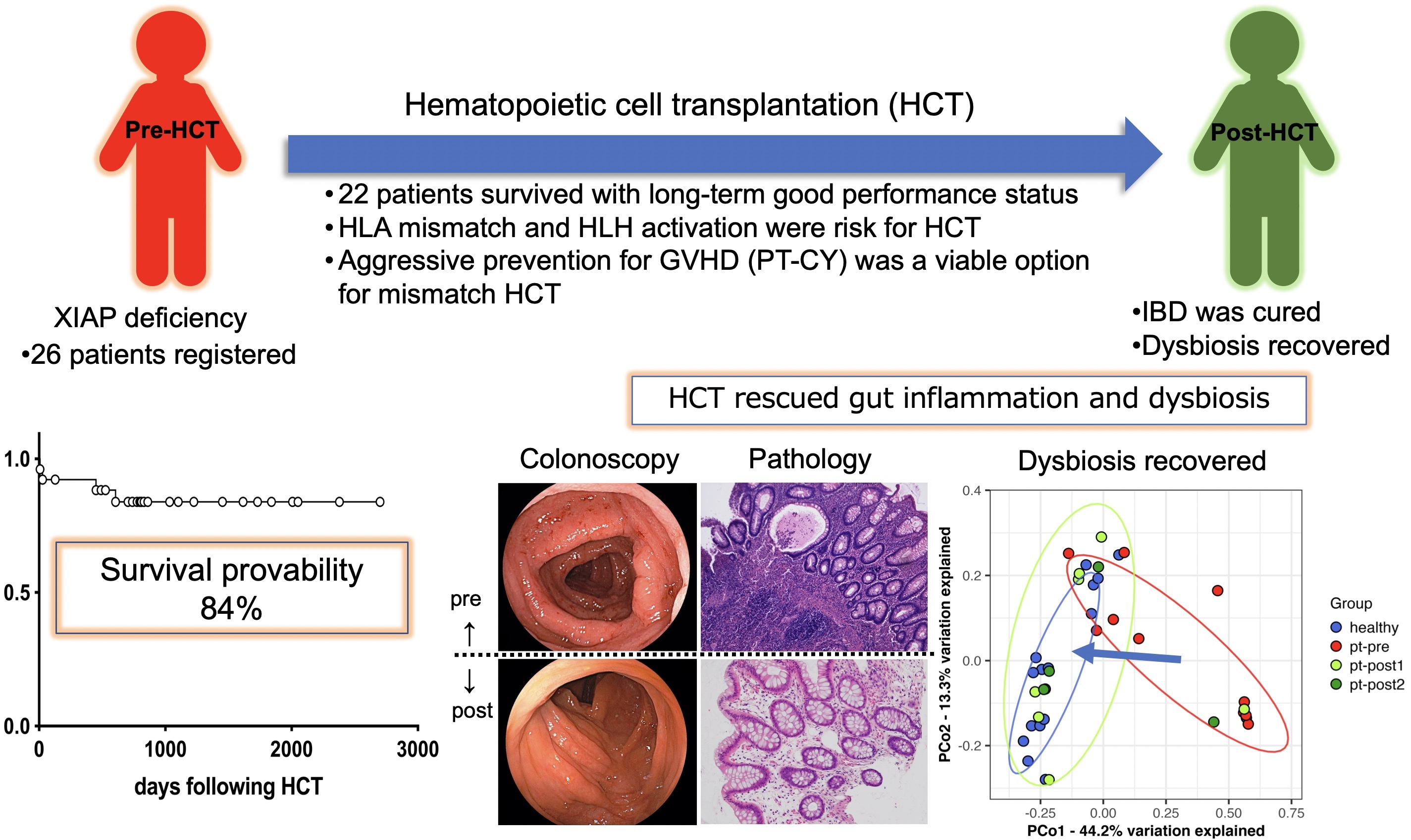Restoring healthy gut bacteria through blood stem cell transplantation
Tokyo, Japan – What does hematopoietic cell transplantation (HCT)—where stem cells that can differentiate into different types of blood cells are taken from a donor individual and transplanted into a recipient individual—have to do with bacteria in the digestive tract, commonly known as the gut microbiota? Although they might seem unrelated, researchers in Japan have recently uncovered a link between the two.
X-linked inhibitor of apoptosis protein (XIAP) deficiency is a rare immunodeficiency disorder that presents in infancy or early childhood. It is often accompanied by severe inflammatory bowel disease (IBD) that doesn’t respond well to drugs, but patients can be cured by HCT. In a study published last month in The Journal of Allergy and Clinical Immunology: In Practice, researchers from Tokyo Medical and Dental University (TMDU) have revealed that, as well as improving symptoms, HCT normalizes the gut microbiota of patients with IBD associated with XIAP deficiency.
“We know that the gut microbiota is altered in patients with IBD,” says lead author of the study Shintaro Ono. “Because HCT can cure IBD in patients with XIAP deficiency, we wanted to investigate whether the gut microbiota also changed in these patients.”
To do this, the researchers examined the gut microbiota of patients before they underwent HCT, and then looked at the microbiota again after HCT. They then compared the makeup and diversity of each patient’s microbiota with those of close relatives of the patients, who were used as healthy controls.
“As expected, almost all patients achieved remission from IBD,” explains Hirokazu Kanegane, senior author. “We also found that the gut microbiota of patients went from being very different to that of their family members before HCT, to very similar after HCT.”
In particular, the gut microbiota of each patient pre- HCT was less diverse and contained fewer bacteria from the Bacteroidetes group, which have been linked to diabetes, obesity, and irritable bowel syndrome. After HCT, both microbiota diversity and makeup were very similar to those of close relatives.
“Our findings indicate that HCT decreases gut inflammation and restores the gut microbiota in patients with XIAP deficiency,” says Kanegane.
Thus, although the survival rate for HCT remains at around 85%, it is a very promising treatment for patients with IBD associated with XIAP deficiency. Research aimed at improving the survival rate will provide even greater hope for patients and their families.

Hematopoietic cell transplantation rescues gut inflammation and dysbiosisi in patients with XIAP deficiency
Twenty-six patients with XIAP deficiency underwent HCT by the end of March 2020, and 22 (84.6%) survived. IBD improved remarkably after HCT. Gut microbiota indicated dysbiosis before HCT; however, it was improved to resemble that of the healthy family members after HCT. This study revealed that HCT has a favorable outcome for XIAP deficiency. HCT rescues gut inflammation and dysbiosis in patients with XIAP deficiency.
The article, “Hematopoietic cell transplantation rescues inflammatory bowel disease and dysbiosis of gut microbiota in XIAP deficiency,” was published in The Journal of Allergy and Clinical Immunology: In Practice at DOI: 10.1016/j.jaip.2021.05.045
Summary
Journal Article
TITLE:Hematopoietic cell transplantation rescues inflammatory bowel disease and dysbiosis of gut microbiota in XIAP deficiency
DOI:https://doi.org/10.1016/j.jaip.2021.05.045
Correspondence to
Department of Child Health and Development,
Graduate School of Medical and Dental Sciences,
Tokyo Medical and Dental University(TMDU)
E-mail:hkanegane.ped (at) tmd.ac.jp
*Please change (at) in e-mail addresses to @ on sending your e-mail to contact personnels.

